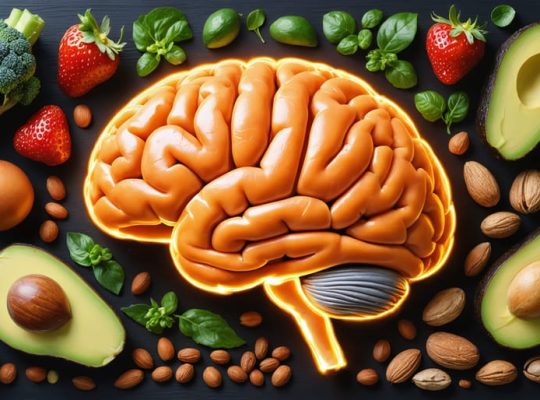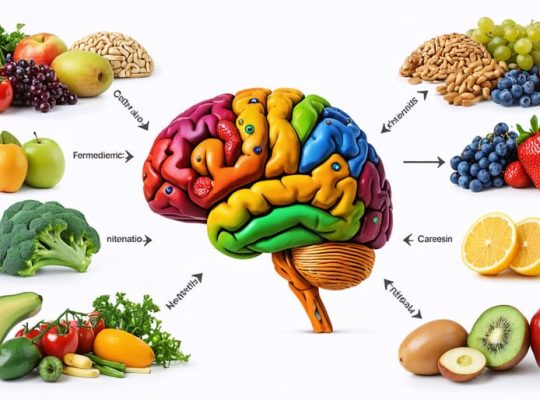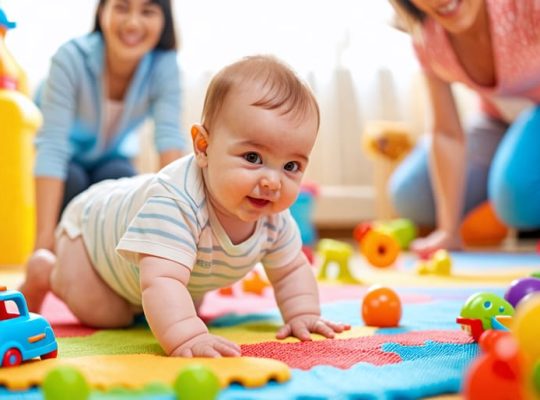The intricate connection between your child’s gut and brain isn’t just fascinating science—it’s a vital key to their mental well-being. Growing research reveals that the trillions of microscopic organisms living in our digestive systems act like tiny conductors, orchestrating everything from mood and behavior to cognitive development. For parents wondering why their child’s stomach troubles often coincide with anxiety or behavioral changes, the answer lies in what scientists call the “gut-brain axis”—a remarkable two-way communication highway that connects these seemingly separate systems.
This powerful link explains why a healthy gut might be just as important for your child’s emotional development as it is for their physical health. When the balance of gut bacteria is disrupted, it can trigger a cascade of effects that influence how your child thinks, feels, and behaves. From influencing the production of essential mood-regulating chemicals like serotonin to supporting immune function that protects brain health, your child’s gut microbiome works tirelessly as a hidden yet crucial player in their mental well-being.
The Fascinating Connection Between Gut and Brain
What is the Gut-Brain Axis?
Think of the gut-brain axis as a two-way street connecting your belly to your brain. This remarkable communication system works through several pathways, including the vagus nerve (often called the body’s superhighway), hormones, and the immune system. Just like how you might feel butterflies in your stomach when you’re nervous, or lose your appetite when you’re stressed, this connection shows us that our gut and brain are constant conversation partners.
Your gut is home to trillions of helpful bacteria that produce important chemicals, including some of the same ones your brain uses to regulate mood and behavior. These tiny helpers create about 90% of your body’s serotonin, often called the “happy chemical.” When we talk about the gut-brain axis, we’re really describing an amazing partnership where your digestive system and mind work together to keep both your physical and emotional health in balance.
This special connection helps explain why what happens in one area can significantly affect the other, making it crucial for overall well-being.
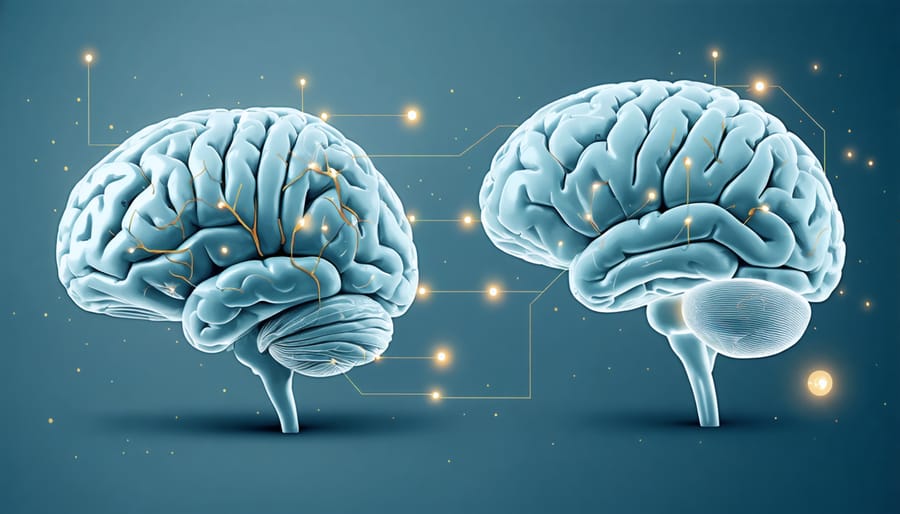
The Role of Good Bacteria
Good bacteria in our gut do much more than just help with digestion – they’re like tiny helpers that support our mental wellness too. These beneficial microbes produce important chemicals, including serotonin (often called the “happy hormone”), which plays a crucial role in mood regulation and emotional well-being.
Think of these helpful bacteria as gardeners tending to a beautiful garden. They maintain a healthy environment in our digestive system, which in turn helps our brain function better. They break down the food we eat into nutrients that support brain health, reduce inflammation throughout the body, and even help manage stress responses.
Dr. Sarah Martinez, a pediatric gastroenterologist, explains: “When children have a diverse population of good bacteria in their gut, we often see better emotional regulation and fewer anxiety symptoms. It’s like having a well-balanced ecosystem that supports both physical and mental health.”
These beneficial bacteria also help strengthen the gut barrier, preventing harmful substances from entering the bloodstream and potentially affecting brain function.
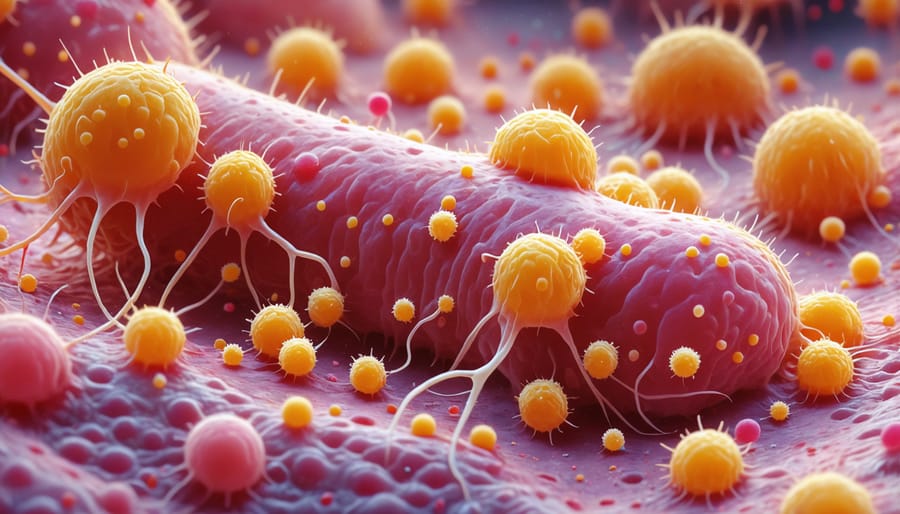
How Gut Health Affects Children’s Emotions and Behavior
Anxiety and Mood Changes
Recent research has revealed a fascinating connection between our gut microbiome and emotional well-being. Think of your gut as a second brain – it’s constantly communicating with your actual brain through what scientists call the gut-brain axis. When your child maintains a healthy relationship with food, they’re not just nourishing their body; they’re supporting their emotional health too.
Dr. Sarah Chen, a pediatric psychiatrist, explains: “The bacteria in our gut produce neurotransmitters like serotonin – often called the ‘happy hormone’ – which plays a crucial role in mood regulation. When gut health is compromised, we often see changes in anxiety levels and emotional stability.”
Parents often notice this connection in their children’s daily lives. For example, when Jessica’s 8-year-old son started experiencing anxiety, their family doctor suggested examining his diet alongside traditional anxiety management techniques. After improving his gut health through dietary changes, his parents noticed significant improvements in his mood stability.
The gut microbiome’s influence on anxiety and mood isn’t just about feeling good or bad – it affects how we process emotions, handle stress, and maintain emotional balance throughout the day. This connection helps explain why children might feel anxious or irritable after eating certain foods or during periods of digestive discomfort.
Focus and Learning
Recent research has shown a fascinating connection between our gut microbiome and cognitive abilities, including focus and learning capacity. Dr. Sarah Chen, a pediatric neurologist, explains, “The gut-brain connection is like a two-way street, with our microbiome significantly influencing how well we can concentrate and process information.”
Studies have found that children with a diverse and healthy gut microbiome tend to perform better on attention tasks and show improved learning outcomes. This connection works through various mechanisms, including the production of important neurotransmitters that affect concentration and memory formation.
“I noticed a remarkable difference in my son’s focus after we made changes to his diet,” shares Maria Rodriguez, mother of a 9-year-old. “Within weeks of incorporating more fiber-rich foods and reducing processed sugars, his teachers reported better classroom participation and improved attention span.”
The microbiome’s influence on learning extends beyond just concentration. It also affects:
– Memory retention
– Information processing speed
– Problem-solving abilities
– Emotional regulation during learning
Supporting your child’s gut health through a balanced diet rich in whole foods, fruits, and vegetables can create an optimal environment for learning and development. Probiotic-rich foods like yogurt and fermented vegetables may also help maintain this delicate balance, potentially leading to better focus and academic performance.
Remember that every child is unique, and changes in diet should be discussed with healthcare providers to ensure they align with your child’s specific needs.
Supporting Your Child’s Gut and Mental Health
Diet and Nutrition Tips
Supporting a healthy gut microbiome through diet is one of the most effective ways to promote both digestive and mental wellness. Research continues to show how diet impacts mental health through the gut-brain connection, making food choices particularly important.
Focus on incorporating these gut-friendly foods into your family’s meals:
– Fiber-rich fruits and vegetables like apples, berries, leafy greens, and sweet potatoes
– Fermented foods such as yogurt, kefir, and sauerkraut that contain beneficial probiotics
– Whole grains like oats, quinoa, and brown rice
– Lean proteins including fish rich in omega-3 fatty acids
– Prebiotic foods like bananas, onions, and garlic that feed good bacteria
Just as important as knowing what to eat is understanding what to limit:
– Processed foods high in artificial ingredients
– Excess sugar and artificial sweeteners
– Refined carbohydrates
– Foods with unnecessary preservatives
Try making small, manageable changes like swapping white bread for whole grain or adding a serving of yogurt to breakfast. Remember that every positive choice counts, and it’s okay to make gradual adjustments that work for your family.
Sarah, a mother of two, shares: “When we started including more whole foods and reducing processed snacks, we noticed improvements in both our children’s mood and focus within a few weeks. The key was making it fun and involving the kids in meal planning and preparation.”
Consider keeping a food diary to track how different foods affect your child’s mood and behavior. This can help identify patterns and make informed choices about what works best for your family.
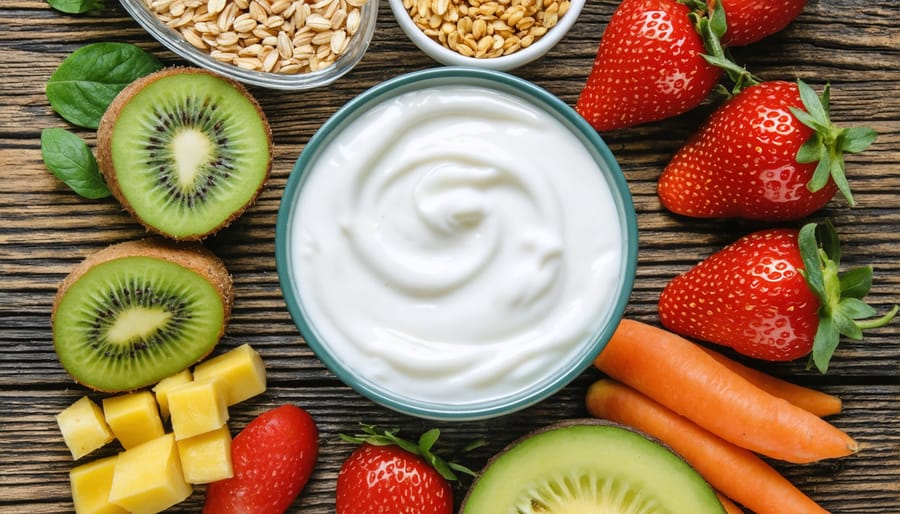
Lifestyle Factors
Our daily lifestyle choices play a significant role in shaping both our gut health and mental well-being. Stress, in particular, can disrupt the delicate balance of our gut microbiome, leading to digestive issues and mood changes. When children experience stress, their bodies produce cortisol, which can alter gut bacteria composition and affect how they process emotions and handle challenges.
Quality sleep is another crucial factor, as research shows how sleep affects eating habits and gut health. During restful sleep, our digestive system repairs and rebalances itself, supporting both physical and emotional wellness. Children who maintain regular sleep schedules often show better gut health and more stable moods.
Exercise also contributes significantly to a healthy gut-brain connection. Physical activity stimulates the growth of beneficial gut bacteria while releasing mood-boosting endorphins. Even simple activities like playing in the park or dancing around the house can make a difference. Dr. Sarah Martinez, a pediatric gastroenterologist, shares: “I’ve seen remarkable improvements in children’s gut health and mood when families make regular physical activity a priority.”
Additionally, spending time outdoors and engaging in relaxing activities can help reduce stress and support gut health. Simple practices like deep breathing exercises or gentle yoga can activate the parasympathetic nervous system, which promotes healthy digestion and emotional regulation. These activities are particularly beneficial when incorporated into daily routines, creating a positive cycle that supports both gut and mental health.
The fascinating connection between gut health and brain function opens up new possibilities for supporting our children’s mental well-being. As we’ve explored throughout this article, the gut-brain axis plays a crucial role in emotional regulation, cognitive development, and overall mental health.
Remember, small changes in diet and lifestyle can make a significant difference in your child’s gut microbiome. Starting with simple steps like incorporating more fiber-rich foods, reducing processed sugars, and adding probiotic-rich foods can create positive changes. Many parents have reported improvements in their children’s mood and behavior after making these dietary adjustments.
While the science of gut health continues to evolve, we now have enough evidence to take proactive steps. Consider working with your healthcare provider to develop a personalized plan for your child. This might include dietary changes, stress management techniques, or probiotic supplementation when appropriate.
Don’t feel overwhelmed by trying to make all changes at once. Start with one small modification, like adding a serving of vegetables to dinner or switching to whole grain bread. These incremental changes can add up to significant improvements over time.
By nurturing your child’s gut health today, you’re investing in their mental and emotional well-being for the future. Remember, every family’s journey is unique, and what works best for your child may take some time to discover. Stay patient, observant, and committed to supporting your child’s overall health through this holistic approach.



